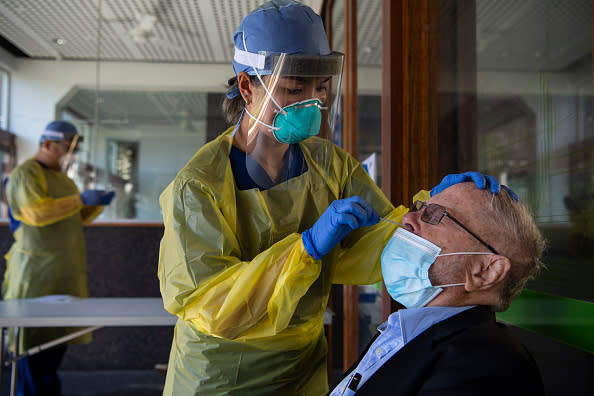Scientists warn of ominous coronavirus development
Coronavirus may have mutated and could now be even more contagious than ever, according to a new study.
A 33-page report released by the US-based Los Alamos National Laboratory studied the spike protein in the virus.
Live blog: Coronavirus news and updates
The spike protein is essentially what doctors and scientists are targeting because it mediates the infection of human cells. It’s how they can develop a vaccine.
However, researchers have found the spike protein now has “14 mutations... that are accumulating”.
“The mutation Spike D614G is of urgent concern; it began spreading in Europe in early February, and when introduced to new regions it rapidly becomes the dominant form,” researchers wrote.

The protein was first found in seven of 183 sequences the lab studied in early March – four of the seven were from Europe, and one each from Mexico, Brazil and Wuhan.
It’s believed Wuhan, China, is where the virus originated.
However, by mid-March, as the virus became more prevalent and was being tracked by the Global Initiative on Sharing All Influenza Data (GISAID), the protein “was present in 29 per cent of the global samples, but was still found almost exclusively in Europe” after looking at about 6000 samples.
'It's baby steps': The lockdown rule that could be lifted next
WHO hits back at explosive claims coronavirus was born in lab
Troubling new theory emerges on Trump's 'horrible' virus prediction
Another study in early April found the D614G “frequency was increasing at an alarming pace throughout March, and it was clearly showing an ever-broadening geographic spread”.
By the end of March, after sampling cases in North America, the protein strain was found to be the most dominant form in the US and Canada.
The researchers noted “there is clearly an urgent need to develop a vaccine” and had doubts over whether seasonal changes might kill some cases.

“If the pandemic fails to wane, this could exacerbate the potential for antigenic drift (genetic change in the virus), and the accumulation of immunologically relevant mutations in the population during the year or more it will take to deliver the first vaccine,” they wrote.
“Such a scenario is plausible, and by attending to this risk now, we may be able to avert missing important evolutionary transitions in the virus that if ignored could ultimately limit the effectiveness of the first vaccines to clinical use.”
Dr Bette Korber, the study's lead author, wrote on Facebook the mutation was “worrying”.
"When viruses with this mutation enter a population, they rapidly begin to take over the local epidemic, thus they are more transmissible,” she wrote.
According to Johns Hopkins University, more than 3.6 million people have been infected with COVID-19 worldwide.
More than 250,000 have died from it.
Do you have a story tip? Email: newsroomau@yahoonews.com.
You can also follow us on Facebook, Instagram and Twitter and download the Yahoo News app from the App Store or Google Play.





